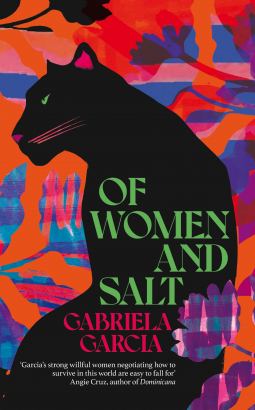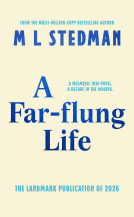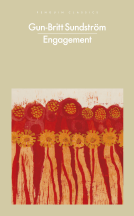
Of Women and Salt
by Gabriela Garcia
This title was previously available on NetGalley and is now archived.
Send NetGalley books directly to your Kindle or Kindle app
1
To read on a Kindle or Kindle app, please add kindle@netgalley.com as an approved email address to receive files in your Amazon account. Click here for step-by-step instructions.
2
Also find your Kindle email address within your Amazon account, and enter it here.
Pub Date 15 Apr 2021 | Archive Date 15 Apr 2021
Pan Macmillan | Picador
Talking about this book? Use #OfWomenandSalt #NetGalley. More hashtag tips!
Description
The New York Times Bestseller
'Extraordinary . . . stunning' – Elizabeth Macneal, author of The Doll Factory
'Vivid details, visceral prose and strong willful women' – Angie Cruz, author of Dominicana
'Vivid, engrossing, luminous' – Sharlene Teo, author of Ponti
Five generations of women, linked by blood and circumstance, by the secrets they share, and by a single book passed down through a family, with an affirmation scrawled in its margins: We are force. We are more than we think we are.
1866, Cuba: María Isabel is the only woman employed at a cigar factory, where each day the workers find strength in daily readings of Victor Hugo. But these are dangerous political times, and as María begins to see marriage and motherhood as her only options, the sounds of war are approaching.
1959, Cuba: Dolores watches her husband make for the mountains in answer to Fidel Castro’s call to arms. What Dolores knows, though, is that to survive, she must win her own war, and commit an act of violence that threatens to destroy her daughter Carmen’s world.
2016, Miami: Carmen, still wrestling with the trauma of displacement, is shocked when her daughter Jeanette announces her plans to travel to Cuba to see her grandmother Dolores. In the walls of her crumbling home lies a secret, one that will link Jeanette to her past, and to this fearless line of women.
From nineteenth-century cigar factories to present-day detention centres, from Cuba to the United States to Mexico, Gabriela Garcia’s Of Women and Salt follows Latina women of fierce pride, bound by the stories passed between them. It is a haunting meditation on the choices of mothers and the tenacity of women who choose to tell their truth despite those who wish to silence them. For fans of American Dirt by Jeanine Cummins and Girl, Woman, Other by Bernardine Evaristo.
Advance Praise
'Gabriela Garcia captures the lives of Cuban women in a world to which they refuse to surrender and she does so with precision and generosity and beauty.' Roxane Gay, author of Bad Feminist
'A fierce and powerful debut. Garcia wields narrative power, cultivating true and profound work on migration, legacy, and survival.' Terese Marie Mailhot, bestselling author of Heart Berries
Available Editions
| EDITION | Other Format |
| ISBN | 9781529031515 |
| PRICE | £14.99 (GBP) |
| PAGES | 224 |
Average rating from 53 members
Featured Reviews
 Sarah T, Reviewer
Sarah T, Reviewer
This is almost five short stories which come together at the end of the book. It is the lives, loves, and tribulations of five women from the US, Cuba and Mexico.
The prose is engaging, and the female characters try their best in the circumstances that fate has dealt them. It is a fascinating look into the ongoing US migration issues.
I am hugely impressed that this a debut novel - the 'force' is very much with Gabriela Garcia.
 Graham F, Reviewer
Graham F, Reviewer
"She knew and, despite the weight of it, accepted her role as liberator of a frightened man. María Isabel thought it had always been women who wove the future out of the scraps, always the characters, never the authors. She knew a woman could learn to resent this post, but she would instead find a hundred books to read."
In 1870 Victor Hugo replied to a letter from the Cuban exile Emilia Casanova de Villaverde – wife of the novelist Cirilo (author of the novella Cecilia Valdés) with a letter addressed to the women of Cuba – a country then struggling to free itself from Spanish domination – writing of exile and of occupation
“Women of Cuba, I hear your cries. Fugitives, martyrs, widows, orphans, you turn to an outlaw; those who have no home to call their own seek the support of one who has lost his country. Certainly we are overwhelmed; you no longer have your voice, and I have more than my own: your voice moaning, mine warning. These two breaths, sobbing for home, calling for home, are all that remain. Who are we, weakness? No, we are force.’”
These last words – handwritten in a first edition of “Les Misérables” – form the thread which holds together this novel – which despite its brief length – roams across 6 point of view narrators, 5 generations and 4 countries.
The author, who grew up in the Miami Latinx community and is the daughter of Mexican and Cuban immigrants has said “I had the ambitious idea of combining all these different threads I was obsessed with: Cuba, America, detention, deportation, addiction, privilege” using the voices of women – an idea she explored in her MFA Thesis which was the genesis of this book – an exploration of all of those ideas, of the mother daughter relationship, and of divides across colour, social class, country and generations.
The book begins briefly in 2018, with a short cry of despair from Carmen (a wealthy, first generation immigrant from Cuba living in Miami) to her estranged, addict daughter Jeanette – pleading with Jeanette to turn from her destructive drug addiction and prove that she wants to live, so that Carmen can begin to bridge the divides between them: a divide which built up due after the death of Jeanette’s father when she shocked Carmen (who had tolerated his alcoholism due to the prosperity she married into) with the truth of his behaviour; and which was exacerbated by Jeanette’s assumptions about the reason why Carmen cut off all links with her mother (Jeannette’s grandmother) Dolores who still lives in Cuba.
The first full chapter plunges us back to Cuba in 1866 (a time of increasing guerilla activity) and the family matriarch (Dolores’s grandmother) María Isabel – the only female cigar roller in a factory. María Isabel is inspired and then courted by the factory lector who gifts her first Cecilia Valdés (which “spoke of the Spanish and creole social elite, love between free and enslaved Black Cubans; a mulatto woman, her place in their island’s history. Even so, the author creole, an influential man”) and then Les Misérables – both of which he reads in the factory alongside the daily newspapers (along with Hugo’s letter to de Villaverde) before authoritarian intervention costs him his job and drives him into subversive activities.
We then switch to Miami in 2014 – the newly recovering Jeanette (although still drawn to her abusive boyfriend and fellow addict Mario) sees her Central American neighbour taken away by ICE agents and impulsively takes in her abandoned daughter Ana, to the strong disapproval of Carmen who tries to convince her she is imperiling her parole.
We then join Ana’s mother Gloria – an illegal immigrant from El Salvador (having fled M13 gang violence – readers of Valeria Luiselli’s brilliant “Tell Me How it Ends” will immediately identify with the brief references to decades of American complicity in creating their own refugee crisis as well as in the strong and deserved critiques of the Obama regime’s warped immigration policies) – in a detention centre without Ana.
Later point of view narrators (both first and third party, both past and present tense) are Carmen, Ana and Delores.
One of the most impressive aspects of the book is the author’s ability to write in so many different styles and voices – the book effectively has the form of a series of stand-alone and striking short stories coalescing around two related families as well as the themes mentioned earlier in my review .
The María Isabel chapter has a portentous and old-fashioned tone; the first Carmen chapter (titled “The Encyclopedia of Birds") features a brilliant set of avian facts and analogies for the character’s situation.
Later we have: a young adult tale of lost virginity mixed with the discovery of the body of an illegal immigrant; a two-girl road trip into the Cuban countryside followed by an awkward family reunion that causes them to examine their assumptions and prejudices; a prosperous tale of a thanksgiving dinner gone wrong – and a microcosm of the tensions and preoccupations of the older Cuban Castro-refugee community in Miami, mixed with an animal mystery; an account by the abused wife of a Castro freedom fighter; the observations of a girl working on a beauty counter in a department store and her deductions of a wealthy couple who shop with her; a childhood story of growing up as a Salvadorian house maid with an American ex-pat in Mexico; an American Dirt style border crossing - before the two families are drawn back together.
I was drawn to this book due to the number of 2021 preview literary fiction features in which it has appeared – and having read it, suspect it will feature in many best of 2021 lists in a year’s time as well as some prize lists during the year – albeit the publishing date (of mid-April) means it will not be eligible for this year’s Women’s Prize (for which this would seem a certainty to make at least the longlist)
"In the margin of one page, .. was Jeanette’s handwriting below another note in faded script that seemed to spell out the same thing. We are force, the scribble read. And then Jeanette had added her own words, We are more than we think we are. And though [she] had no idea why Jeanette had written those words, she chose to believe the sentence, the scribble, was a cry across time. Women? Certain women? We are more than we think we are. …. She had no idea what else life would ask of her, force out of her …. She thought that she, too, might give away the book someday, though she had no idea to whom. Someone who reminded her of herself maybe. Someone who liked stories. She said thank you and put the book aside."
Ultimately this is a brilliant book for those who like stories. And as I put the book aside I say thank you to the author and thanks to Pan Macmillan for an ARC via NetGalley.
Powerful, beautiful, heart-warming; Garcia's "Of women and salt" deals with 5 generations of women in Cuba, Mexico and Miami and delves into important topics such as womanhood, family ties, migration, heritage.
 Reviewer 632489
Reviewer 632489
Starting in a 19th century Cuban cigar factory, Of Women and Salt follows the women of one family, jumping back and forth through generations and skipping through time as more of their stories unfold across countries, detention centres, and (literal) revolutions. Jeanette is just out of rehab and trying to understand her family's past in Cuba; something her mother Carmen refuses to talk about, so Jeanette has become friends with her cousin in Havana. Seeing her Salvadorean neighbour picked up by ICE, Jeanette takes in the daughter who has been left behind, adding another voice to the story.
Gabriela Garcia weaves all of these women's stories together expertly - considering that the novel is only 200 pages long, all six of Garcia's narrators feel fully fleshed out, and I was completely invested in them. I think if you like intergenerational stories like Homegoing, you'd like this!
✨ thanks to @picadorbooks & #netgalley for the proof!
Great debut! This interesting novel takes you from Cuba to Mexico to modern-day Miami. Jeanette's story felt so very relevant. I thought it was really well done so much heart in a short book.
Of Women and Salt is a novel about choices, immigration, and motherhood that moves from 19th century Cuba to 21st century Miami. In 1866 in Cuba, Maria Isabel is the only woman working at the cigar factory, but war is coming. And in Miami in 2016, Carmen, a first generation Cuban immigrant, is trying to get her daughter Jeannette to stay sober, whilst Jeanette wants to go to Cuba to understand the past her mother doesn't talk about. And a few years previous, a chance act by Jeanette affects the life of Ana, a young girl who lives across the street with her mother who is about to be deported back to El Salvador.
Told in episodes that move between points of view, time, and place, this is a rich novel that looks at different immigrant circumstances (particularly at the experience of Cubans coming to America and then people from Central American countries like Mexico and El Salvador) and how choices impact people's lives. It is woven together well, with Carmen and Jeanette's strained relationship taking an important place in the novel, especially around the reasons behind each of their perspectives and what they've faced and the difficulty they have in telling the truth to each other. Through Jeanette, the novel looks at drug addiction and the opioid crisis in Florida, and also at how she longs for Cuba though she's never been, and doesn't find it quite what she expects.
The other narratives in the novel bring in other elements, from a contemporary tale of detention centres and the difficulties of making it to the US and staying there to moments from 1866 and 1959 in Cuba which show political moments through the eyes of individual women who have to fight to survive on a more personal scale. The different stories are brought together cleverly to give an overall picture of women battling for themselves and their families and how their individual struggles reflect wider political and social events.
Of Women and Salt is a vivid and powerful novel that grips you as it shows you major moments in its protagonists' lives. The focus on these individuals and their place in the wider world made it easier for me to keep up with than some other multi-generational novels and I found myself reading it more quickly than I expected.
Where to begin with this book? It absolutely captivated me, drawing me into the lives of several characters, some bound by blood, all bound by their lived experiences as women. The sole female worker in a 19th century Cuban cigar factory, the wife and mother abused by her husband who fights for Fidel Castro, the drug addict, the 'illegal' immigrant and her daughter, the mother trying to protect, failing. A rich, flawed cast of characters set against multiple backdrops and timelines. We are force.
The writing at times is smooth and absorbing, like the gentle lapping of the sea upon the shore; other times it is brutal, a tornado smashing into a glass house, shattering prejudices and perceptions and leaving a mess in its wake. My only criticism is that I wanted, needed, more.
Good read about mothers and daughters, finding your cultural history and the past, forming relationships and caring for one another. The historical context of the story from the Cuban factories to ICE adds depth to the story of five women in Cuba, US and Mexico. A good debut
(Will be featured in a short list on Vogue India March 2021 issue)
 Deja R, Reviewer
Deja R, Reviewer
“I don’t know why I am here and I am alone and I am praying to a god I’m not sure exists but if she exists she is surely a bird, surely a migrating bird doing battle, surely she will break these walls.”
Of Women And Salt tells the story of several generations of women from a family in Cuba and Miami. In addition, another storyline comes together, of a mother & daughter who migrated to Miami from El Salvador and is then deported to Mexico. All of these women deal with issues such as immigration, domestic, loss and addiction. Each of them wonders "what if..” What if they had made a different decision? Could they have foreseen the impact their decisions would have on the next generation?
“I made a choice again, for you. And I am sorry I had nothing else to offer, Ana. That there are no real rules that govern why some are born in turmoil and others never know a single day in which the next seems an ill-considered bet. It’s all lottery, Ana, all chance. It’s the flick of a coin, and we are born.”
This novel is beautifully written. Garcia gives each woman her own voice and so it almost feels like you are reading a collection of short stories. Very impressive.
 Nikki B, Book Trade Professional
Nikki B, Book Trade Professional
An absolutely beautiful book; deeply engrossing, richly poetic, and an education about the lives of women and families over time. I picked this book up after reading positive review after positive review, and I was hooked from the first page. The atmosphere the author creates in the cigar workhouses, as well as the depth of the characters within -- their passion for books and for each other -- sets a tremendous scene. We then shift between pasts and futures, and we learn of the fates not only of the people in the cigar factory, but also of the books they read, hear, and love. The years bring joy and pain, sacrifice and sorrow, love and loss. The systems that barricade these women, and the histories they navigate, drawn frustration and sadness. But the author provides hope, forgiveness, and roads forward. I loved this book, and I can't wait to see it win all the awards this year..
 Reviewer 675379
Reviewer 675379
Five generations of women, back and forth in time, between Miami, Cuba and Mexico.
Courage, pain, addiction, deportation and more in this evocative and thought provoking novel.
 Philippa L, Reviewer
Philippa L, Reviewer
History. Women. Character. Cuba.
I really enjoyed Of Women and Salt. The book delves deeply into a short episode of each woman's life (there are 5 featured), and frankly all 5 could have merited a book for themselves. The stories come together (as you know they will!) over a few generations of time line. There's some powerful insight into the challenges facing women today and yesterday, and of course the question of identity. Geography, culture and immigration are all explored, and I was left wanting more!
Of Women and Salt was the perfect read around International Women's Day. Following five generations of Cuban women and a Salvadorean mother and daughter, this book takes us on a journey across space and time to witness the strength and tenacity of women who choose to keep fighting against all odds.
These women are the only protagonists here, their voices (often silenced in their daily life) rising prominently to shine a light on their truths, their struggles, their pain, and their hopes for a better future. The men in their lives lurk in the background, their viewpoint unimportant and their main contribution being bringing pain and tears - or being conspicuously absent. The women finally take centre stage and reclaim what is theirs, even if only for short stretches. The book's nonlinear narration, in fact, means that it often reads more like a series of short stories or vignettes linked by a common thread.
Don't let this book's size fool you: despite being quite short, it is packed with content and material for reflections. It also takes some dark turns, and I found I often had to stop to give myself time to absorb what I'd just read and digest some of the harder themes. Covering everything from domestic violence to drug abuse, sexual violence and the harsh reality of a modern-day US immigration detention centre, Of Women and Salt is as far as from a light read as possible. Nevertheless, I really enjoyed it, in its own way.
The writing was beautiful and lyrical, and it quickly drew me in. The characters were complex and portrayed excellently, even if we only spent a limited time with each of them. The thing I struggled with most was the non-linear narration, but that's something I know I often find hard to follow. Each time/location change was clearly marked at the beginning of the new section, but I still found I often had to go back to remind myself how far in the future or in the past we had moved compared to what had come before.
Overall, this is a powerful book and a really strong debut from the author, and I look forward to reading more of her works in the future. Of Women and Salt takes an honest look at the harsh reality of life for many women, restoring their voices and their dignity, and certainly made me wish for the day when for women everywhere stories like this will be just that - stories.
CW: domestic abuse, sexual violence, imprisonment, child abuse, death, violence, drug abuse and addiction.
Of Women and Salt is a beautifully written book by Gabriela Garcia. This novel explores 5 generations of women, their relationships and the trauma they share.
Main focus of the story is Jeanette, daughter of Cuban immigrants, who is battling addiction and the results of childhood abuse. Jeanette witnesses Gloria, a neighbour, being taken by ICE, and she opens her home to Gloria’s young daughter, Ana. Throughout the novel, parallel to Jeanette’s family history, we also find out what happens to Ana and her mother, and the horrors of the family immigration detention centers.
Throughout the novel, we then get to know Jeanette’s mother, Carmen, and her Grandmother, Dolores, witnessing how their past formed them, and ultimately understanding why the shared matrilineal trauma shaped who they are.
The book also briefly touches on racism in Cuba, and how Cubans are perceived in the US, as opposed to other Central and Southern American people.
To say I enjoyed this novel would be a lie: it was painful to read, and really, really sad. I also felt that some of the marginal characters felt a bit flat, but overall it was incredibly well written and evocative.
A daughter's fateful choice, a mother motivated by her own past, and a family legacy that begins in Cuba before either of them were born
In present-day Miami, Jeanette is battling addiction. Daughter of Carmen, a Cuban immigrant, is determined to learn more about her family history from her reticent mother and makes the snap decision to take in the daughter of a neighbour detained by ICE. Carmen, still wrestling with the trauma of displacement, must process her difficult relationship with her own mother while trying to raise a wayward Jeanette.
While dealing with addiction, Jeannette tries to help her neighbour child who has been left behind when ICE detains her mother. She also is learning about her Cuban family history, while her mother Carmen is determined not to talk about it. I really liked this story, despite it not being the usual type of book that I like. It’s definitely unique. The language is poetic; it flows beautifully. It’s a generational story.
This is a first for me by the author and one I enjoyed and would read more of their work. The book cover is eye-catching and appealing and would spark my interest if in a bookshop. Thank you very much to the author, publisher and Netgalley for this ARC.
 Reviewer 531382
Reviewer 531382
Incredibly fast paced, beautifully written novel juxtaposed to such a dark and heartbreaking story of the experiences of 5 generations of Cuban women.
Switching between the characters and different years, we learn all about the stories of these women who have been through it. I enjoyed the character and year switching, it was easy enough to figure out who was who and how they related, different characters and where we were at a time. It's important to remember the date though, just in case you're back or forward in time.
From a debut author all I can say is amazing, and I would read so much more.
It took a lot for me not to have a good sob at the end.
Content warnings for substance abuse and domestic abuse.
Thanks to NetGalley, Pan Macmillan and Gabriela Garcia for an eArc copy of this novel in exchange for an honest review..
*TRIGGER WARNING: MENTAL HEALTH ISSUES, DRUG ABUSE, VIOLENCE*
Of Women and Salt is a touching novel by Gabriela Garcia. It’s a whole female narration spanning decades across Central and North America.
The characters’ lives run parallel and sometimes overlap in singular and unexpected ways. We live with them in Cuba, Miami and Mexico – between the second half of the nineteenth century to 2018.
Generation after generation, from Maria Isabel to Dolores to Jeanette, we meet the women of a family split between two countries, facing all sorts of challenges and building strong characters for themselves.
Of Women and Salt is made of heart-breaking stories and challenging truths about being women, about immigration, mental health and drug abuse.
There’s the right balance of hope and sadness, you’ll feel angry and scared and you’ll remember these women for a long time after you put the book down.
A suggestive debut, I’m looking forward to new works from Gebriela Garcia and I will definitely recommend Of Women and Salt to everyone I know in the entire book community.
 Grace L, Reviewer
Grace L, Reviewer
Synopsis: The lives of the women of a Cuban family and a Salvadorian family become entangled when a woman is taken by ICE, leaving her daughter behind.
•••
⭐️⭐️⭐️⭐️⭐️/5
I really really enjoyed this book and raced through it. Garcia’s storytelling is beautiful and captivating, her characters real and interesting. This is an intergenerational story of women, strong and struggling, finding their way to safety, belonging, freedom - whatever that means to them.
The story spans from 1866 Cuba to present-day Miami, sharing stories of a woman’s ancestors to relate her struggles with theirs. I’m a sucker for any book about mother-daughter relationships, and though every one in this book was strained in some way, I adored the focus on these relationships, how family legacy travelled down through the women of the family. A Spanish edition of Les Mis ties the women of the family together, and in it is written a quote - “Who are we, weakness? No, we are force.” These words inspire each generation of women in the family.
Of Women And Salt explores racism within Cuba and the US, what it means to have never met your family that live in another country and to be a tourist in the one where your ancestors come from, and the differences in privilege within the immigrant community that arises from documentation, class and education.
I’ve seen some really interesting debate around the representation in this book, primarily around the one black character and the two Salvadorian characters, how their stories of trauma primarily serve as character development opportunities for the white Cuban family. I actually didn’t necessarily find that - I was as invested in Ana and Gloria’s story as I was with Jeanette and her family. There are so many layers to this book, and whilst Garcia doesn’t at all shy away from showing privileged characters of all types of ethnicities, racist characters, the harshness of civil war, the traumas of deportation and trying to cross back into the US, she doesn’t fully explore them, as there’s so much in there. If anything’s clear from this book, it’s that these issues aren’t just black and white - the characters are dimensional, some privileged, some following a long history of racism within Cuba.
If you read this book, be sure to read more from @lupita.reads and here:
https://tastefulrude.com/of-women-and-salt-rubs-salt-in-the-wounds-of-the-black-caribbean/
•••
TW: drug addiction and abuse, sexual and physical abuse
•••
Publishes in the UK: 15 April 2021
#OfWomenAndSalt
Advance digital copy from #NetGalley
Trigger warnings: spousal abuse, child molestation, sexual violence, drug addiction.
*Of Women and Salt* is one of my favorite books of 2021, so far. This book focuses on the overlapping stories of immigration in Florida and overlapping Latinx identities. In particular, this book focuses on the difference between the Cuban community in Miami and other Latinx communities. In interviews Gabriela Garcia has given to *[Parade](https://parade.com/1188656/meganoneill/gabriela-garcia-of-women-and-salt-book-interview/)* and *[Vogue](https://www.vogue.com/article/gabriella-garcia-women-and-salt)*, she notes these themes as central to dismantling the myths around the "immigrant experience," and showing that the Latinx community(ies) is not a monolith. The Elián González episode of You're Wrong About also talks about Cuban immigration to Florida and the United States' "wet-foot-dry-foot policy," and it is worth a listen if you need some background.
[You're Wrong About - Elián González](https://podcasts.google.com/feed/aHR0cHM6Ly9yb3R0ZW5pbmRlbm1hcmsud29yZHByZXNzLmNvbS9jYXRlZ29yeS9wb2RjYXN0L2ZlZWQv/episode/aHR0cHM6Ly9yb3R0ZW5pbmRlbm1hcmsub3JnLz9wPTExODUy?sa=X&ved=2ahUKEwjV5YbquebuAhVOrVkKHSLRAR8QkfYCegQIARAF)
The narrative starts in a cigar factory in Cuba in 1866 and then moves to Miami, Florida in 2014, setting up contrasts between the different women we follow throughout the book. Jeanette is a woman of Cuban descent whose relationship with her Cuban mother is under tension. Their already difficult relationship is tested when Jeanette's neighbor, Gloria is taken from her home and sent to a detention center and Jeanette takes in Gloria's young daughter, Ana. Carmen's attitude towards Gloria and Ana, undocumented immigrants from El Salvador, sets up the discussions comparing Cuban immigration in the past to more recent immigration to the US.
Throughout this book, we get to inhabit the perspectives of multiple generations of women and girls in the two families on which this book centers. Garcia's writing effortlessly moves between these different perspectives and gives them each a unique style. For example, when one of the main characters Jeanette is a teenager in 2002, the writing perfectly reflects the vibe of being a teenager in 2002. These subtle changes from each perspective helps the reader connect to each of the characters better. Garcia connects the different sections really well and the transitions never feel jarring. Absolutely masterful.
Other types of immigration are also discussed – for example, there a minor character from the US who moves to Mexico, but clearly does not see herself as an "immigrant," but rather an "expat." There is a German man living in Cuba who thinks of himself the same way. The differences between who is an "immigrant," vs. an "expat," changes the way people are treated. The discrimination against some characters who "immigrated," to Mexico (dumped there by US immigration), is another contrast in the "immigrant experience." Gloria and Ana are both deported early in the narrative and are dumped in Mexico and told by the US immigration authorities that they should "make their way back to El Salvador," from there, even though they have no resources to do so.
Garcia also shows race and racism to be important in Latinx communities. This is a further complication to how Cubans and Cuban-Americans see themselves vs. "other" Latinx people:
> “But it isn’t as though Black Cubans fare better in Miami, where racism is polite, quiet. This is fact: In Miami, Cubans will scoff when you call the, Latino. “I’m not Latino, I’m Cuban,” they will say. By which they mean, *I am white, another kind of white you don’t know about, outsider*.”
For non-fiction titles on race and racism in the Hispanic Caribbean, see:
- [Prostitution, Modernity, and the Making of the Cuban Republic, 1840-1920](https://www.bookdepository.com/Prostitution-Modernity-Making-Cuban-Republic-1840-1920-Tiffany-Sippial/9781469608945) by Tiffany A. Sippial
- [The Mulatto Republic](https://www.bookdepository.com/Mulatto-Republic-April-J-Mayes/9780813061962) by April J. Mayes
- [Imposing Decency: The Politics of Sexuality and Race in Puerto Rico, 1870-1920](https://www.bookdepository.com/Imposing-Decency-Eileen-J-Suarez-Findlay/9780822323969) by Eileen J. Suarez Findlay
- [Reproducing Empire: Race, Sex, Science, and U.S. Imperialism in Puerto Rico](https://www.bookdepository.com/Reproducing-Empire-Laura-Briggs/9780520232587) by Laura Briggs
The ending is tied up nicely without feeling too neat. I was very satisfied and would absolutely re-read this book in the future. Five stars, would recommend.


















